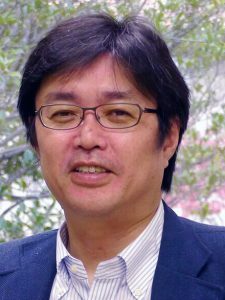- This program has finished.
- Lecturer: Araki Hiroshi (Professor, Nichibunken)
- Commentator: Gaye Rowley (Professor, Waseda University)
- Date: Tuesday, January 30, 2018, 6:30-8:00 pm (Doors open at 6:00 pm)
- Venue: Lecture Hall, International House of Japan
- Coorganized by International Research Center for Japanese Studies (Nichibunken)
- Language: Japanese (without English interpretation)
- Admission: Free
- Seating: 100 (reservations required)
The relationship model seen in Hikaru Genji’s wife and child, Onna Sannomiya and Kaoru, in The Tale of Genji is related to the karmic story of Buddha’s wife and the birth of his child. This has been a common interpretation since the medieval era. In the 14th century this interpretation expanded to the story of the prince (Reizei), born through the affair of Genji and Fujitsubo, also being interpreted as a moral parable of Buddha’s wife and child. In either case, illicit intercourse and the“two fathers” were themes that the important figures in The Tale of Genji shared. What is the meaning in bringing the Buddha’s life history into the interpretation of The Tale of Genji?
As a major work of world literature, The Tale of Genji is bound to have unique interpretations and be rediscovered from wide international perspectives. This lecture will attempt to give new perspectives to the common interpretation of The Tale of Genji and seek new possibilities of reading it.
As a major work of world literature, The Tale of Genji is bound to have unique interpretations and be rediscovered from wide international perspectives. This lecture will attempt to give new perspectives to the common interpretation of The Tale of Genji and seek new possibilities of reading it.
Araki Hiroshi (Professor, Nichibunken)
 Received a Ph.D. in literature from Kyoto University. Specializes in Japanese Classic Literature. After assuming a position as professor at Osaka University, Prof. Araki assumed his current position in 2010. He has been visiting professor at various universities such as Columbia University, Nehru University, Zurich University, and Vietnam National University. His books include Setsuwashu no Koso to Isho (Bensei Shuppan, 2012), Kakushite Genji Monogatari ga Tanjosuru (Kasamashoin, 2014), and Tsurezuregusa eno Michi: Chuseibito no Kokoro to Kotoba (Bensei Shuppan, 2016). He has also edited books such as Chuse no Zuihitsu (Chikurinsha, 2014), and Yume Miru Nihon Bunka no Paradigms (Hozokan, 2015).
Received a Ph.D. in literature from Kyoto University. Specializes in Japanese Classic Literature. After assuming a position as professor at Osaka University, Prof. Araki assumed his current position in 2010. He has been visiting professor at various universities such as Columbia University, Nehru University, Zurich University, and Vietnam National University. His books include Setsuwashu no Koso to Isho (Bensei Shuppan, 2012), Kakushite Genji Monogatari ga Tanjosuru (Kasamashoin, 2014), and Tsurezuregusa eno Michi: Chuseibito no Kokoro to Kotoba (Bensei Shuppan, 2016). He has also edited books such as Chuse no Zuihitsu (Chikurinsha, 2014), and Yume Miru Nihon Bunka no Paradigms (Hozokan, 2015).
 Received a Ph.D. in literature from Kyoto University. Specializes in Japanese Classic Literature. After assuming a position as professor at Osaka University, Prof. Araki assumed his current position in 2010. He has been visiting professor at various universities such as Columbia University, Nehru University, Zurich University, and Vietnam National University. His books include Setsuwashu no Koso to Isho (Bensei Shuppan, 2012), Kakushite Genji Monogatari ga Tanjosuru (Kasamashoin, 2014), and Tsurezuregusa eno Michi: Chuseibito no Kokoro to Kotoba (Bensei Shuppan, 2016). He has also edited books such as Chuse no Zuihitsu (Chikurinsha, 2014), and Yume Miru Nihon Bunka no Paradigms (Hozokan, 2015).
Received a Ph.D. in literature from Kyoto University. Specializes in Japanese Classic Literature. After assuming a position as professor at Osaka University, Prof. Araki assumed his current position in 2010. He has been visiting professor at various universities such as Columbia University, Nehru University, Zurich University, and Vietnam National University. His books include Setsuwashu no Koso to Isho (Bensei Shuppan, 2012), Kakushite Genji Monogatari ga Tanjosuru (Kasamashoin, 2014), and Tsurezuregusa eno Michi: Chuseibito no Kokoro to Kotoba (Bensei Shuppan, 2016). He has also edited books such as Chuse no Zuihitsu (Chikurinsha, 2014), and Yume Miru Nihon Bunka no Paradigms (Hozokan, 2015).Gaye Rowley (Professor, Waseda University)
 Born and grew up in Australia. She was awarded her Ph.D. by the University Cambridge in 1995 and currently teaches English and Japanese literature at Waseda University, where she is also Associate Director of the Waseda University Library. She has written and/or translated several biographies of Japanese women, including Yosano Akiko and The Tale of Genji (2000), Autobiography of a Geisha (2003), The Female as Subject: Reading and Writing in Early Modern Japan (2010), and An Imperial Concubine’s Tale: Scandal, Shipwreck, and Salvation in Seventeenth-Century Japan (2013). Currently she is translating Ōgimachi Machiko’s auto/biography Matsukage nikki (In the Shelter of the Pine, ca. 1710-12).
Born and grew up in Australia. She was awarded her Ph.D. by the University Cambridge in 1995 and currently teaches English and Japanese literature at Waseda University, where she is also Associate Director of the Waseda University Library. She has written and/or translated several biographies of Japanese women, including Yosano Akiko and The Tale of Genji (2000), Autobiography of a Geisha (2003), The Female as Subject: Reading and Writing in Early Modern Japan (2010), and An Imperial Concubine’s Tale: Scandal, Shipwreck, and Salvation in Seventeenth-Century Japan (2013). Currently she is translating Ōgimachi Machiko’s auto/biography Matsukage nikki (In the Shelter of the Pine, ca. 1710-12).
 Born and grew up in Australia. She was awarded her Ph.D. by the University Cambridge in 1995 and currently teaches English and Japanese literature at Waseda University, where she is also Associate Director of the Waseda University Library. She has written and/or translated several biographies of Japanese women, including Yosano Akiko and The Tale of Genji (2000), Autobiography of a Geisha (2003), The Female as Subject: Reading and Writing in Early Modern Japan (2010), and An Imperial Concubine’s Tale: Scandal, Shipwreck, and Salvation in Seventeenth-Century Japan (2013). Currently she is translating Ōgimachi Machiko’s auto/biography Matsukage nikki (In the Shelter of the Pine, ca. 1710-12).
Born and grew up in Australia. She was awarded her Ph.D. by the University Cambridge in 1995 and currently teaches English and Japanese literature at Waseda University, where she is also Associate Director of the Waseda University Library. She has written and/or translated several biographies of Japanese women, including Yosano Akiko and The Tale of Genji (2000), Autobiography of a Geisha (2003), The Female as Subject: Reading and Writing in Early Modern Japan (2010), and An Imperial Concubine’s Tale: Scandal, Shipwreck, and Salvation in Seventeenth-Century Japan (2013). Currently she is translating Ōgimachi Machiko’s auto/biography Matsukage nikki (In the Shelter of the Pine, ca. 1710-12).